Sep 2022 2nd Edition
Sep 2022 2nd Edition vuyelwan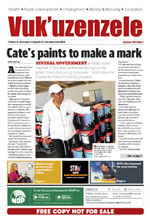
English PDF version
Translations
Afrikaans
isiNdebele
isiXhosa
isiZulu
Sepedi
Sesotho
Setswana
Siswati
Tshivenda
Xitsonga
Alternative energy resources for South Africa
Alternative energy resources for South Africa LondekileMfanelo S’phelele Calvin Ndlela (30) from Durban, KwaZulu-Natal is the founder and director of Electri-Coal Technologies, a company that uses natural resources to generate renewable energy.
The company’s vision is to assist with the energy and water challenges faced by South Africans.
One of its innovations is a remotely controlled biogas unit, which can provide electricity to rural communities. Cow dung, wastewater and organic waste are fed into the biogas digester, which then extracts methane gas and converts it into electricity.
“It is not only cost effective, but also environmentally friendly,” says Ndlela.
Electri-Coal uses a smart utility system to monitor the gas levels in the biogas digester. The system is connected to the biogas tank and controlled using an application on a phone.
Ndlela believes that alternative energy resources can benefit South Africa in the long term because they reduce pollution and create jobs.
He says the youth of South Africa must come together to find energy solutions. However, he says this can only be achieved through teamwork and proper research.
“The youth must work smart, collaborate and grow their ideas into meaningful and sustainable businesses by being passionately focused and driven to succeed.”
Ndlela has seven executives working with him and six to 12 casual workers.
In 2018, his team entered the Global Cleantech Innovation Programme, which resulted in funding from the Technology Innovation Agency, an initiative of the Department of Science and Innovation.
Earlier this year, Electri-Coal was one of 26 winners in the South African Youth Climate Innovation Awards, for its smart water tank monitoring system. The system uses a mobile application to monitor and send alerts to the local municipality when the levels in municipal water tanks are low. Electri-Coal is currently piloting the system with the eThekwini Metropolitan Municipality.
Energy and water-saving tips from Electri-Coal:
- Switch your geyser on during off-peak hours (peak hours are 5pm to 10pm). A 150L geyser needs one hour to heat the water.
- When collecting water from your local water tank, ensure your containers have lids to reduce water wastage. Hint: Keep a spare container of water in case of an emergency or service delivery protests.
- Reuse water from your bath to water your garden.
To contact the Department of Science and Innovation, call 012 843 6300 or visit https://www.dst.gov.za/
Cate’s paints to make a mark
Cate’s paints to make a mark vuyelwanAfter refusing to allow limited resources to stop her from reaching her dream, paint manufacturer Cate Olifant is on course to make her mark in this demanding industry.
Olifant’s journey began in 2016 when she left the construction sector to follow her dream of becoming her own boss.
Although she wanted to create her own paint range, after doing market research, she realised just how much money it would take. She approached a State-owned development finance institution, the Industrial Development Corporation (IDC), for funding, only to be told that her application would only be considered if she was already manufacturing her own paints.
She heeded the advice and Akani Paints was born.
Speaking to Vuk’uzenzele, she says: “I decided to take the risk. I don’t have a background in chemical engineering; I’ve never worked in a chemistry plant nor have I worked on paint [manufacturing] before.”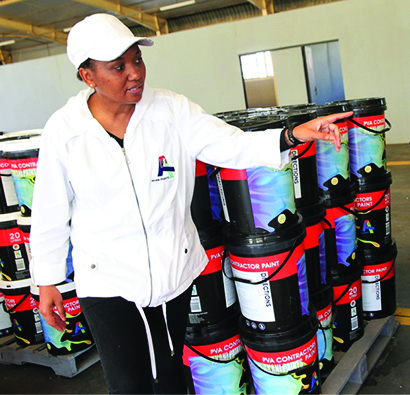
She says after her funding request was turned down, she did relevant short courses and visited several paint manufacturers to learn from them.
Around that time, Olifant relocated from Gauteng to Limpopo, where she set up shop in an abandoned and dilapidated building in the Nkowankowa industrial area.
“When I got the factory in July 2016, I thought, ‘Okay, I have the building, but it is dilapidated.”
Fortunately, she had savings, and although she had to start on a smaller scale than she had initially planned, she was able to renovate the factory.
“I had to get a second-hand machine, which cost me about R60 000, only to find out it wasn’t going to work [because] I still needed other things.”
Over the next few years, Olifant found work and saved what she could to invest in her business.
“In 2019, I started production with my second-hand machine.”
It was not all smooth sailing, she says, with poor paint formulations and money proving to be the biggest challenge. Just as things were starting to look up, the business was affected by the COVID-19 pandemic.
Funding from government
Olifant attributes the survival of Akani Paints to the business training, marketing assistance and help in applying for funding she received from the Small Enterprise Development Agency (SEDA), an entity of the Department of Small Business Development that gives non-financial support to small businesses.
The SEDA has over the years assisted Cate in receiving R400 000 in grant funding into the business from different government entities.
Olifant has also been granted a R1 million loan from the Small Enterprise Finance Agency (SEFA).
While she is still awaiting the release of the funds, she says the money will allow her to build a laboratory, which will enable her to produce paint that is approved by the South African Bureau of Standards (SABS).
Large retailers will only stock SABS-approved paint and the SEDA is assisting her in obtaining this certification.
Job creation
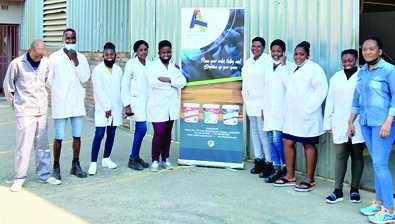 Akani, which makes water-based interior and external paint, employs eight permanent staff members and is hosting ten chemical engineering graduates for 12 months.
Akani, which makes water-based interior and external paint, employs eight permanent staff members and is hosting ten chemical engineering graduates for 12 months.
She says she hopes to increase employment opportunities once her fully equipped laboratory is in place.
Her goal, she says, is to sell her paint internationally, starting with the Southern African Development Community countries.
She received a leg up in this regard from the Department of Trade, Industry and Competition (the dtic), which enabled her to attend an Intra-African Trade Fair in Durban in 2021 to market her products to suppliers in the African continent.
“Looking back, I really appreciate the effort, support, encouragement and training given by the dtic, SEDA, Productivity SA, Limpopo Economic Development Agency and the Greater Tzaneen Municipality,” says Olifant.
If you are an entrepreneur looking for funding, contact the following entities:
- SEDA - 0860 663 7867/www.seda.org.za
- SEFA - 012 748 9600/ www.sefa.org.za
- IDC - 0860 693 888/ www.idc.co.za
Dr Decent Mkhombo finds joy in serving his community
Dr Decent Mkhombo finds joy in serving his community UrsulaA young man who grew up in rural Mpumalanga achieved his medical degree when he was only 21, and is now giving back to his community as an intern doctor.
At just 22, Decent Mkhombo is a qualified doctor doing his internship training at Mapulaneng Hospital in Bushbuckridge, Mpumalanga.
Mkhombo believes that the youth of South Africa have the answers to the problems we face in our country and the public service. He says that young people should be given an opportunity and a platform to express their ideas and solutions, which will keep the public service moving forward.
This, in turn, will allow for better service delivery in communities, especially those that need it most, he says.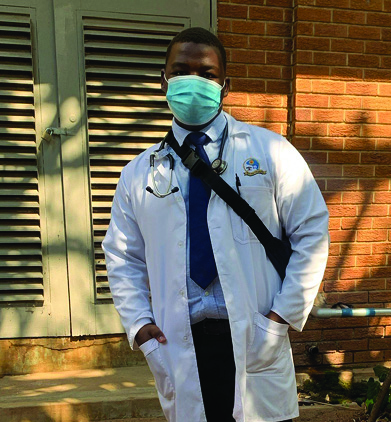
“The organisational culture in the public service should be promoting new thinkers and young thinkers by giving them leadership roles,” says Mkhombo.
Born and raised in Thulamahashe, Mpumalanga, Mkhombo matriculated at Orhovelani High School and then went to the University of Limpopo to do his Bachelor of Medicine and Bachelor of Surgery degree.
He says that he did not initially plan to become a doctor, but after a conversation with his father, soon realised that he had the character of one.
“The pace of my life led me to different places, but when I got to my matric year, I was frozen by choice.
I ended up sitting down with my father, who discussed my strengths and weaknesses with me and that is how we got here.”
In 2016, Mkhombo was among the first group of students enrolled at the newly introduced medical school at the University of Limpopo – when he was just 15 years old! He received a bursary from the Limpopo Department of Health.
Even though he is so young, Mkhombo says he is fortunate not to have faced discrimination or bullying from his colleagues or his patients. He says that he understands the quality of his work speaks for him and he is confident that he is well equipped to do his job.
Mkhombo chose to do his internship training at Mapulaneng Hospital because he wants to serve his community and give back before he chooses his next path in life.
“I came back to give back to the community that raised me,” he says.
As an intern, Mkhombo is rotating between different departments in the hospital, so he can be exposed to various specialties. Although he has not decided what he wants to specialise in, he is considering nuclear medicine, which involves using small amounts of radioactive substances to take pictures of areas inside the body and to treat disease.
Mkhombo believes working in a public hospital is not difficult because of the structures and protocols in place. It is easier to do the work when you are focused on the patients and what is best for them, he says, adding that as a public health worker, treating patients with dignity and respect goes a long way in serving them.
“To me, being a public servant means not making your patient feel like less of a person.”
Mkhombo says his job is not about the title, but the recognition he gets for helping those in need.
Becoming a doctor
Universities have different entry requirements, but in general, if you want to become a doctor, you need to pass matric with an average of 70–75% (excluding life orientation). Every year, more students apply to study medicine than the universities can accommodate, so you must achieve excellent marks in mathematics, physical sciences and life sciences, which are compulsory subjects if you want to become a doctor.
Visit the websites of individual universities to find out their specific entry requirements.
EC music promoters have something to sing about
EC music promoters have something to sing about LondekileThe Eastern Cape Department of Sport, Recreation, Arts and Culture has given R300 000 each to six recording companies to help develop the province’s musical talent.
The grants are part of the Music Excellence Acceleration Programme established in 2020, which supports musicians and music producers in developing and recording their works.
Aviwe Gqomfa (30) from Seymour in the Raymond Mhlaba Municipality is a beneficiary of the programme. His recording company, Avee Connexion Holdings, which was established in 2012, is all about preserving authentic sounds in the area.
“Avee Connexion existed even before its registration in 2016. It has been discovering and developing artists, recording and producing music, writing hits and putting together shows since 2012, nearly a decade now.
“Buying and maintaining studio equipment and funding and developing artists takes money. It is hard to get ahead without a flexible budget. This programme provided us with that – a flexible budget that will allow us to push across borders and grow the Eastern Cape music industry nationally and globally,” he says.
Gqomfa says he will use the funds he received to create quality music videos for his existing artists and to create new music.
The Eastern Cape Department of Sport, Arts and Culture says there are plans for a bigger budget to reach the other remote and rural areas.
How to apply for the Music Excellence Acceleration Programme
Documents needed to apply for the Music Excellence Acceleration Programme include:
- Company owner details and identification
- Company name, registration number and VAT documents
- A budget proposal
- Portfolio of work previously done.
For more information, call the department at 043 492 0241 or email General Manager Mzonke Stofile on 082 380 8221 or mzonke.stofile@ecsrac.gov.za
Filmmaker brings Frances Baard to life
Filmmaker brings Frances Baard to life LondekileDetermined, strong and resilient. These are words that have been used to describe struggle stalwart Frances Baard and her relentless fight against the racist apartheid government.
South African filmmaker Mercia Wechoemang (33) – who hails from Kimberley, the same town as Baard – has produced a documentary about Baard’s life showing her resilience on the big screen.
A filmmaker for the past eight years, Wechoemang says the documentary, titled The Spirit, is her best work yet.
Wechoemang says the seed for the documentary was planted when she saw Baard’s statue in Kimberley’s city centre.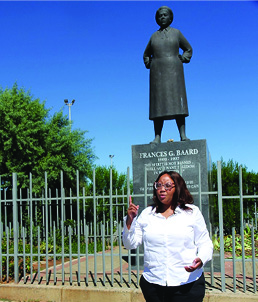
“I was passing there where her statue is and I wondered who this woman is. We know that there is a district [municipality in the Northern Cape] that is named after her, but who is she? Why is she being celebrated and do people know her story?
“It is important to know our heroes because this is our heritage and it will always be part of us. If you don’t know your heritage, you don’t know who you are. Heritage is part of our culture,” she says.
Wechoemang says the path to bringing her idea to life was not easy, with the documentary taking more than five years to complete due to financial challenges. However, she received funding from the Department of Trade, Industry and Competition’s (DTIC) South African Emerging Black Filmmakers Incentive, which enabled her to complete the project.
“I submitted a proposal to the DTIC and they came on board to assist me to complete the production. I don’t think I would have been able to complete it without them,” Wechoemang says.
“The entertainment industry as a whole is male-dominated and women need to occupy that space. I am not saying that men are not good filmmakers, but if more women come into the industry, maybe we will have a different narrative because a man cannot tell a female story the way a woman can,” she says.
Did you know?
The Government Communication and Information System's head office is on Frances Baard street in Pretoria.
For more information about the DTIC South African Emerging Black Filmmakers Incentive, visit http://www.thedtic.gov.za/financial-and-non-financial-support/incentive…
Look out for early signs of childhood cancer
Look out for early signs of childhood cancer UrsulaA lack of awareness of childhood cancer and its symptoms means that many South African children are diagnosed when the disease is at an advanced stage.
The earlier cancer is diagnosed and treated, the higher the chance of a full recovery. 
Childhood Cancer Foundation South Africa (CHOC) Communication Coordinator Taryn Seegers says by knowing the common signs of cancer in young people, you could help save a life.
“The signs and symptoms can be difficult to spot amid the normal bumps, bruises, growth spurts and mood swings. However, early detection is key,” she says.
According to the Cancer Association of South Africa (CANSA), between 800 to
1 000 South African children are diagnosed with cancer each year.
However, the association estimates that half of the children with cancer in South Africa are never diagnosed.
To help ensure cancer is spotted as soon as possible, CHOC runs awareness programmes in communities, telling parents and children about the early warning signs they must look out for.
The foundation supports children and teenagers with cancer or life-threatening blood disorders and their families.
“We aim to improve early detection and facilitate effective treatment. At any one time, CHOC can have over 1 500 children and teenagers in its care, while offering psycho-social support to over 1 500 families,” says Seegers.
In the past financial year, Seegers says CHOC was able to serve 1 724 children, 553 teenagers and
2 232 adults through its core programmes.
“Our services include emotional support through their cancer journey, comfort, end-of-life care and bereavement support,” says Seegers.
St Siluan’s signs of childhood cancer
- S – Seek medical help early for ongoing symptoms.
- I – White spot in the eye, new squint, sudden blindness or bulging eyeball.
- L – Lump on the stomach, pelvis, head, arms, legs, testicle or glands.
- U – Unexplained fever present for over two weeks, weight loss, fatigue, pale appearance, easy bruising and bleeding.
- A – Aching bones, joints, back and easy fractures.
- N – Neurological signs, a change in walking, balance or speech, continuous headaches with/without vomiting and an enlarged head.
“Teenagers, busy with sports and activities, often do not notice the first symptoms of their cancer,” says Seegers.
For more information, contact the CHOC helpline at 0800 333 555 or visit www.choc.org.za
Matlou keeps an eye on her community's vision
Matlou keeps an eye on her community's vision UrsulaAfter witnessing how being blind affected her grandmother, a young girl vowed that she would one day help people in her community with vision problems.
Manare Matlou made good on her promise and today, at the young age of 23, has an optometry practice, Optic iCare Optometrists, in Giyani, which she opened in February 2022. 
The daughter of pastors, Matlou was raised in Ga-Phadi in Limpopo. After matriculating from a local high school, she earned her Bachelor of Optometry degree from the University of Limpopo in 2020, at the age of 21. She then worked for several practices to gain experience and knowledge of running a practice.
Matlou says many people in her rural village live with vision problems and blindness because they cannot afford eye surgery. She says the extreme heat in the area contributes to people getting cataracts and light sensitivity eye diseases.
Because of the need for better eye care in the community, she chose to open her practice in Giyani. “You need to have business knowledge to start a private practice and you must learn from colleagues in the industry.”
Matlou says opening an optometry practice is expensive, because of the cost of the equipment and spectacle frames needed. She also had to hire two assistants. As soon as her business is better established, she wants to open more practices and offer pensioner discounts.
Look after your eyes
Eye Care Awareness Month, which runs from September 21 to October 18, aims to educate people on the importance of eye health and regular screenings to avoid future complications. The Department of Health recommends that you have your eyes tested every one to two years. If you have risk factors such as high blood pressure and diabetes, it is best to do it every year.
Matlou adds that a well-balanced diet, including nutrients like omega-3 fatty acids, lutein, zinc, and vitamins C and E, helps combat age-related vision problems. She also recommends people wear sunglasses to protect their eyes from the sun’s ultraviolet rays.
She also said that Optometrists offer primary eye care. They are trained to detect vision problems, eye diseases and other abnormalities. If needed, they supply glasses. If specialist care is needed, optometrists refer their patients to the right
specialist.
People wanting to study for an optometry degree at university level need to have done english, mathematics, physical sciences and life sciences at grade 12. It takes a minimum of four years to complete, and a one-year internship is compulsory.
New approach to fight corruption gets results
New approach to fight corruption gets results vuyelwanFrom The Union Buildings
The fight against corruption requires both firm political will and independent, capable crime-fighting institutions.
In my first State of the Nation Address, in 2018, I made a commitment to turn the tide against corruption in our public institutions and fight fraud and collusion in the private sector with the same intensity and purpose.
Since then, we have been working hard to strengthen and support our law enforcement and related agencies. We set up the Investigating Directorate in the National Prosecuting Authority to deal with serious corruption and the Special Tribunal to enable the Special Investigating Unit (SIU) to more easily recover stolen funds. We have also provided support and resources to other critical crime-fighting bodies like the Asset Forfeiture Unit, Specialised Commercial Crimes Unit and Directorate for Priority Crime Investigation, known as the Hawks.
These efforts are producing results.
Through collaboration with key entities in the criminal justice system, the Investigating Directorate has enrolled over 20 corruption cases in the last financial year and 65 accused have been charged. These include several ‘state capture’ and other serious corruption cases.
In the past financial year, the Asset Forfeiture Unit obtained freezing orders to the value of R5.4 billion relating to corruption offences, with R70 million paid into the Criminal Assets Recovery Fund.
Over the past eight years, the SIU has recovered funds and assets to the value of R2.6 billion and set aside contracts to the value of R18 billion. A total of 119 cases worth more than R13 billion have been enrolled by the SIU at the Special Tribunal.
Corruption is an extremely complex crime to prosecute.
Perpetrators go to extraordinary lengths to cover their tracks. They set up shelf companies to hide dodgy transactions, rapidly moving monies between multiple accounts, misrepresenting income to the tax authorities, and, in the case of government employees, using friends and relatives to apply for tenders to mask their involvement.
This means that the response of the authorities has to be just as sophisticated. 
In 2020, we established a multidisciplinary Fusion Centre as an operational hub to address priority financial crimes, including corruption. The centre brings together the investigative capabilities of government’s crime prevention and security structures and those of the Financial Intelligence Centre, which develops intelligence for law enforcement agencies to use in their investigations.
Two years since the Fusion Centre was established, its multidisciplinary approach to ‘follow the money’ has yielded significant results.
In the last financial year, the work of the Fusion Centre supported 276 fraud and corruption investigations. Approximately R659 million was restored to the State through preservation and recovery of the proceeds of crime. Approximately R613 million in suspected criminal proceeds were frozen.
The Fusion Centre was initially set up to investigate corruption around COVID-related procurement. Its mandate is now being expanded to include money-laundering, fraud, maladministration, terrorist financing and other serious financial crimes.
The Hawks recently outlined some of the progress that has been made by the Anti-Corruption Task Team, of which the Fusion Centre forms part. Between the 2019 and 2022 financial years, 554 suspects were arrested for corruption, of which 142 were convicted.
Another vital financial intelligence tool is the lifestyle audits conducted by the South African Revenue Service (SARS). Last year, SARS completed 25 lifestyle audits to the value of over R450 million to resolve discrepancies between declared income and an individual’s lifestyle.
It is clear that the measures we have taken as this administration to restore the capacity, capability and credibility of the institutions involved in the fight against corruption are having a demonstrable impact.
The synchronised work of all the law enforcement agencies is hitting criminals where it hurts most: in their pockets. Public funds that were looted and diverted are being recovered and those responsible for these acts are being prosecuted by our courts.
To further strengthen our efforts to turn the tide against corruption, I am announcing appointments to the National Anti-Corruption Advisory Council.
The Council will bring together stakeholders from across society to oversee the implementation of government’s anti-corruption strategy. The new body will advise government on the critical preventative measures, institutional capabilities and resources needed to prevent a recurrence of state capture and to stamp out fraud and corruption in South Africa.
Our ultimate aim is to build strong and resilient institutions that can end corruption and withstand any future attempts at state capture.
As we continue to build on these successes, we are confident that even if it takes time, those who stole and looted resources meant for the people will face the consequences of their actions.
Paving the way for other women
Paving the way for other women vuyelwanDeputy Minister in the Presidency Thembi Siweya says women leaders, influencers and thought leaders have a duty to pave the way for others to follow, as many women remain marginalised and have no voice.
In her opening remarks at the Women’s Socio-Economic Empowerment and Advancement webinar recently, Minister Siweya commended the women of 1956 who marched to the Union Buildings in Pretoria and the many others who have paved the way for a better tomorrow for all.
The event was organised by Government Communication and Information System (GCIS) in partnership with Brand South Africa, BintiAfrika Konnect and Mail & Guardian.
“As women, we need to use our collective voices and our influence. I know all of us have faced many challenges and that despite our successes we are still burdened in additional ways merely by being women,” Minister Siweya said.
Women, she said, are known to invest in their children's health and education, which hold enormous benefits in the fight against the triple challenge of unemployment, inequality and poverty.
Also taking part in the webinar, Mmabatlharo Nono Dihemo, the Senior Gender Advisor at the United Nations Assistance Mission for Afghanistan, said since the COVID-19 pandemic, gender inequality has deepened.
By 2021, there were fewer jobs for women compared to men. “As governments responded, women’s needs were rarely at the centre,” she said.
Dihemo said violence against women and girls also intensified during the pandemic. It was detrimental to women’s economic security and exacerbated existing inequalities in unpaid care work.
Victoria Rowan, the Research and Media Strengthening Project Officer, and Binti Afrika, the co-founder and Eastern/Central Africa Editor, emphasised the need to educate African girls to become informed and empowered leaders in their communities.
“Legal protection, healthcare and access to training and job skills, so that girls can thrive, [and] making a difference in their lives and their communities will empower socio-economic rights to female youth,” Rowan said.
GCIS Director-General Phumla Williams said there are solutions to some of the many problems that can achieve meaningful change.
“The negative socio-economic effects from the COVID-19 pandemic also threaten to undo the many inroads we have made over the years in advancing women. If we are to stay the course, we must redouble our efforts. We must work towards the complete and equal integration of women into all aspects of our society,” Williams said.– SAnews.gov.za
Play recounts the story of apartheid’s double agents
Play recounts the story of apartheid’s double agents LondekileIf you think South Africa has documented enough stories and films about the torturing and killings of citizens under the apartheid regime, you are mistaken. There is more the public needs to know about.
One story that needs telling is that of the freedom fighters who became double agents and deadly assassins for the infamous Vlakplaas death squad. Their story is told in Askari, which runs at the South African State Theatre from 27 September to 16 October.
Vlakplaas is a farm located 20 kilometres west of Pretoria that served as the headquarters of the notorious South African Police Security Branch’s C1 unit.
Director and co-writer Sello Maseko drew inspiration for the theatre production in 2019 when he was invited to be part of a delegation that visited Vlakplaas.
He says that 40 years ago, many atrocities took place at the farm. Anti-apartheid activists were brutally tortured there and Vlakplaas was filled with pain, fear, misery, uncertainty and death.
The play honours those heroes and heroines who perished in the torture chambers of Vlakplaas, says Maseko.
Askari tells the story of the men and women who infiltrated organised civic movements and student organisations to recruit unsuspecting youth and influential leaders.
“It interrogates the decisions that led to their choice of turning from insurgents to counter-insurgents, from community activists to mass killers. It digs deep into the personal accounts of these individuals, who administered pain, fear and death,” says Maseko.
Themes of betrayal and death, redemption and forgiveness are told through dance, music and powerful storytelling.
As a historian and storyteller, Maseko saw fit to make this contribution to the truth and reconciliation process to help communities heal and move on.
“The story of foot soldiers of apartheid whose job description was to kill needed to be told, and I had to be the one telling it,” he says.
Askari was nominated for Best Script and Choreography in the 2022 Naledi Theatre Awards. It made its stage debut last year at the South African State Theatre. The production was filmed at the time and later screened at selected Ster-Kinekor venues.
Tickets are available at Webtickets: www.webtickets.co.za
Plucky sisters start chicken business
Plucky sisters start chicken business UrsulaSisters Nqobile (27) and Bongiwe (22) Khumalo are poster girls for the saying ‘where there is a will, there is a way’.
Residents of Warrenton in the Northern Cape, they are proof that you do not need many resources to be innovative. Nqobile, a trained paramedic and firefighter, and Bongiwe battled to find employment in their town and decided to save part of their R350 COVID-19 social relief of distress grants to use as start-up capital for a poultry business. 
They had recently been to a local agricultural event and were inspired by how farming could both provide an income and contribute to the development of the country.
“After a few months of saving our grant and other funds, we had about
R5 000 and decided to use that to buy 200 chicks, drinkers and feed. That is how GC Blue Lagoon, trading as the ‘Khumalo Sisters’ Chickens’ started,” says Nqobile.
The sisters now raise 600 broiler chicks at a time, which they slaughter at six weeks and sell whole to the community.
Nqobile said the teething difficulties they met included having little to no experience in farming and having to learn on the job.
“We used to wake up as early as 2am to put a brazier in our makeshift chicken run to warm the chicks to optimise growth. It was during these trying months that we learnt valuable farming lessons and made inroads with regard to contacts and how to grow the company.”
New opportunities
In 2021, confident about the growth of their business, the Khumalo sisters approached the National Youth Development Agency (NYDA) for funding and training.
“Eventually, we were accepted to attend two types of business management training held at the regional offices. Following the training courses, we were told that we qualified to apply for a business grant,” says Nqobile.
She says with help from the NYDA assistants, they managed to successfully apply and were given R50 000 in grant funding, which they used to buy additional chicks, hire four women to help with the work and buy machinery.
Their next plan is to secure more land so that they can expand their business and create more jobs for local women and youth.
To find out about NYDA opportunities, call 087 158 6345 / 5738 or the toll-free line 0800 58 58 58, email info@nyda.gov.za or visit www.nyda.gov.za
Skills development for rural women
Skills development for rural women UrsulaOver 5 000 underprivileged learners are set to benefit from 25 rural cooperatives that have been set up and funded by the Health and Welfare Sector Education and Training Authority (HWSETA) to manufacture uniforms for schools in their communities.
The initiative, which has ensured that all of the cooperatives are women-led, was launched at one of the factories in Nkomazi, Mpumalanga, recently. 
HWSETA Chairperson Dr Nomfundo Mnisi explains that during COVID-19, the seta provided funding for 19 rural cooperatives to manufacture and distribute cloth face masks, reusable sanitary pads and soap.
“We wanted to encourage community members to form groups and become skilled in the manufacture of relevant essential items,” she says.
In 2021, the HWSETA assisted these cooperatives to purchase industrial sewing machines and fabric and helped them to form businesses. “This enabled them to produce high-quality lab coats and scrubs for HWSETA-linked organisations, such as the Wits Health Consortium and Rui and Ruo Medicals,” says Mnisi.
To ensure that the cooperatives are sustainable and to foster their growth, the HWSETA has now funded these and other cooperatives to manufacture uniforms for poor schools in their communities. The cooperatives will be supported by the HWSETA for three years.
“In the initial stages, we will buy the uniform packs – which include jerseys, trousers, school shirts, skirts and dresses, all made in the local schools’ colours – from the cooperatives, for the learners, so that they have an income,” says Mnisi.
Of the 25 cooperatives, 15 are already operational. The others are in the process of procuring machinery and fabric and will come into operation in time for the start of the 2023 school year.
Upskilling and changing lives
Nomvula Mbatha-Malaza, who heads up the Elnovu Clothing Primary Cooperative in Kamhlushwa, Mpumalanga, says the project has changed her life.
“I like working with people and learning new things and this project has given me the opportunity to teach people new skills,” she adds.
The cooperative has seven members and employs 20 people.
“We were grateful to receive a contract to produce 3 000 scrubs and lab coats for hospitals in the area last year. This year, we’ve been focussing on school uniforms. I am very grateful to HWSETA for giving me the opportunity to uplift others in my community,” says Mbatha-Malaza.
For more information about the HWSETA, visit www.hwseta.org.za
Did you know?
HWSETA falls under the Department of Higher Education and Training. Its role is to help South Africans develop skills and increase their chances of finding jobs that are in line with the economy.
